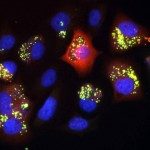Lien vers Pubmed [PMID] – 31254628
Lien DOI – S1286-4579(19)30075-910.1016/j.micinf.2019.06.015
Microbes Infect ; 21(5-6): 222-229
Protein phosphorylation is known to be one of the keystones of signal sensing and transduction in all living organisms. Once thought to be essentially confined to the eukaryotic kingdoms, reversible phosphorylation on serine, threonine and tyrosine residues, has now been shown to play a major role in many prokaryotes, where the number of Ser/Thr protein kinases (STPKs) equals or even exceeds that of two component systems. Mycobacterium tuberculosis, the etiological agent of tuberculosis, is one of the most studied organisms for the role of STPK-mediated signaling in bacteria. Driven by the interest and tractability of these enzymes as potential therapeutic targets, extensive studies revealed the remarkable conservation of protein kinases and their cognate phosphatases across evolution, and their involvement in bacterial physiology and virulence. Here, we present an overview of the current knowledge of mycobacterial STPKs structures and kinase activation mechanisms, and we then focus on PknB and PknG, two well-characterized STPKs that are essential for the intracellular survival of the bacillus. We summarize the mechanistic evidence that links PknB to the regulation of peptidoglycan synthesis in cell division and morphogenesis, and the major findings that establishes PknG as a master regulator of central carbon and nitrogen metabolism. Two decades after the discovery of STPKs in M. tuberculosis, the emerging landscape of O-phosphosignaling is starting to unveil how eukaryotic-like kinases can be engaged in unique, non-eukaryotic-like, signaling mechanisms in mycobacteria.



